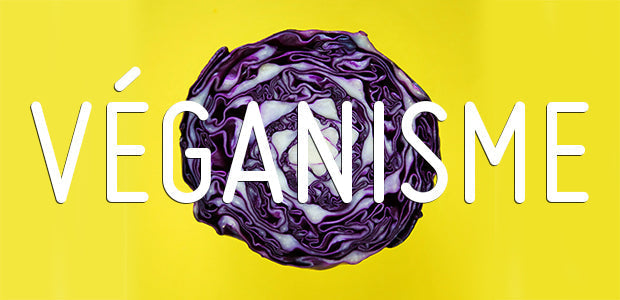Should I go vegan?
These days, the media, blogs, magazines, restaurants and cookbooks are all focusing on veganism, which is gaining in popularity. Veganism is a movement that excludes the consumption of all animal products and all products derived from their exploitation.
Although increasingly present and accessible, veganism (also known as wholefood veganism) is, according to The Vegan Societyan ancestral practice based on vegetarianism.1
We've put together a portrait of this caring philosophy.
Veganism: why adopt it?
Moral reasons
It's estimated that every year, 60 million land animals and a few billion sea animals lose their lives to feed humans. To satisfy this high demand, captivity is the new industry standard. This minimizes the animals' quality of life and encourages the spread of infectious diseases, greatly increasing the need for antibiotics.4
The captive environment, the precarious separation of mother and child, and the premature death of animals, make mass breeding a practice that fails to meet the primary and biological needs of animals, themselves recognized as sentient beings with a right to dignity.5.
Vegans therefore believe that it is preferable for animals to be able to enjoy their natural habitat in peace, without the worry of being slaughtered for food.
Environmental reasons
Animal husbandry has a considerable impact on our environment, motivating the most ecologically-minded among us to adopt a vegan lifestyle.
Entire lands and forests are ravaged to enable the cultivation of grain to feed farm animals. This livestock farming has harmful consequences for our environment, including the loss of clean water, forests and trees, and the accumulation of livestock waste in nearby waters.
In addition to depleting our natural resources, animal husbandry is the primary cause of greenhouse gas emissions,8 the main pollutants being beef, lamb and cheese production.7
Sadly, in addition to these glaring issues, meat consumers throw away 20% of the meat produced by the industry.7
By adopting a vegan diet, a Western person can reduce his or her ecological footprint by over 50%.
Health reasons
Compared with omnivorous and vegetarian diets, the vegan diet offers higher levels of dietary fiber, antioxidants, magnesium, folic acid, vitamins C and E, as well as phyto nutrients (biochemical compounds from plants with positive effects on health). Vegan diets are also lower in saturated fats than other diets.2
For these reasons, vegan dieters have a low risk of cardiovascular disease, high blood pressure, hypercholesterolemia, obesity, type 2 diabetes and certain cancers.3
Veganism: what to eat
Veganism is not automatically a guarantee of good health. It's vital to be well-informed before making the leap to veganism. Education and knowledge of the nutritional aspect are key to the success of this lifestyle.
A well-balanced vegan diet includes plenty of vegetables, fruit, whole grains, legumes, seeds and nuts. Excluded: meat, fish, seafood, dairy products, eggs, honey and insects.
Although veganism offers a wide range of health and environmental benefits, certain dietary deficiencies may arise.
In fact, this diet is lower in calcium, zinc, omega 3, vitamin D and vitamin B12 than other diets.2 Plant-based iron is also more difficult to assimilate. That's why vegans benefit from taking an iron supplement. multivitamin/mineral in addition to fortified foods. In addition, for women, it is recommended to take iron supplements to avoid possible deficiency.
Veganism: the lifestyle
Veganism also excludes all derivatives of animal products used in the textile, cosmetics and pharmaceutical industries.
Many fabrics are excluded, including leather, wool, fur, cashmere and alpaca, as well as certain materials used in jewelry production, such as pearls, feathers and horns. Any product that has been tested on animals is also prohibited.6
Vegans are also careful in their choice of leisure activities, and are opposed to activities that exploit animals, including zoos, aquariums, circuses and safaris.
In short, veganism is a lifestyle that promotes all aspects of animal welfare.
___
La Boite à Grains is pleased to meet your needs by offering a multitude of certified vegan products. What's more, our free store tours in June will focus on veganism.
Finally, we are now a retailer of vegan meals. Aux Vivresmeat-free products from Paradis Végétarien, from Function Jerky Véganeand many other certified vegan products.
About the author
Naturopaths of La Boite à Grains
Team of licensed and certified naturopaths (ND) in Gatineau, Outaouais.
Original article written by Véronique Cousineau, Naturopath
Sources
1: The Vegan Society / History
2: Davey GK, Spencer EA, Appleby PN, Allen NE, Knox KH, Key TJ. EPIC-Oxford: lifestyle characteristics and nutrient intakes in a cohort of 33,883 meat-eaters and 31,546 non-meat-eaters in the UK. Public Health Nutr 2003;6:259-69.
3: Position of the American Dietetic Association and Dietitians of Canada. Vegetarian diets. J Am Diet Assoc 2003;103:748-65.
4: Center for Disease Control and Prevention. National Antimicrobial Resistance Monitoring System for Enteric Bacteria (NARMS). Antibiotic Resistance.
5: CBC. Canadian Press June 2015. Quebec bill calls animals 'sentient beings' and includes jail time for cruelty
6: Wikipedia - veganism
7: Environmental Working Group. Meat Eater's Guide. Accessed April 2018
8: WorlWatch Institute. Agriculture and Livestock Remain Major Sources of Greenhouse Gas Emissions. Laura Reynolds, May 8, 2013




